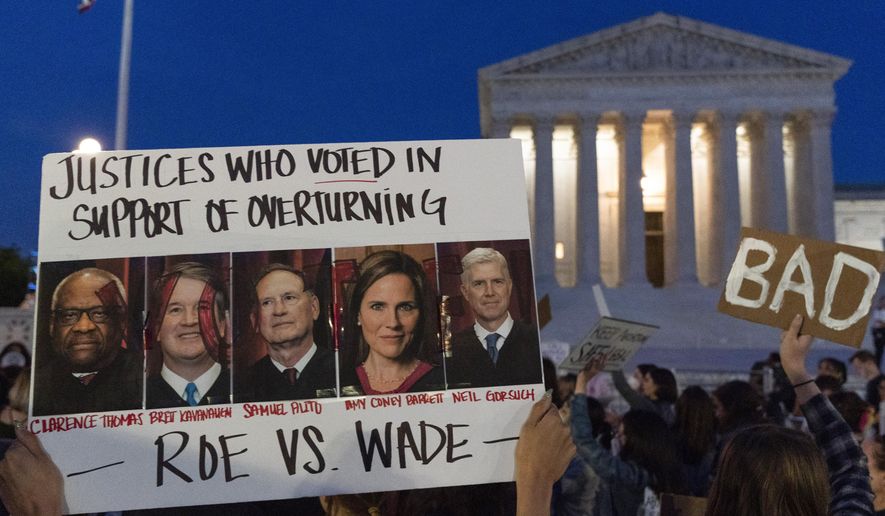A conservative think tank on Thursday sued the Department of Justice over protests outside the homes of Supreme Court justices that erupted in May after the unprecedented leak of a draft opinion overturning Roe v. Wade, arguing that the activists are breaking federal law.
The 31-page lawsuit filed by The Heritage Foundation seeks communications within President Biden’s DOJ about the protests and notes that 18 U.S.C. § 1507 has been used to prosecute others in recent years that have disrupted judicial hearings.
18 U.S.C. § 1507 is the federal law that makes it unlawful to obstruct justice and protest outside the homes of judges and justices. Progressive groups have been rallying activists to protest outside the homes of the conservative justices for roughly five months — even through the start of the new 2022 term.
“Justice Amy Coney Barrett’s children’s schools and her church were targeted. An individual was arrested plotting to assassinate Justice Brett M. Kavanaugh and potentially other Justices in part to ensure Roe was sustained,” the lawsuit read. “But the Department refused to enforce the statute as to the protests at Justices’ private homes.”
Roman Jankowski, senior investigative counsel for The Heritage Foundation’s Oversight Project, said the public must learn why Attorney General Merrick Garland has decided not to prosecute the protesters.
“The Biden DOJ’s silence on these radical protests and obviously intimidating tactics was, and remains to be, deafening. The American people deserve to know why Joe Biden and Attorney General Merrick Garland not only refused to publicly and unequivocally condemn this behavior, but also why they continue not to prosecute or hold accountable those who facially broke the law in an attempt to influence the proceedings of the Supreme Court. We think there are answers to those questions in the documents we have requested, and we have a right by law to those documents,” he said.
Chief Justice John G. Roberts Jr. tapped Supreme Court Marshal Gail Curley days after the leak in May to lead the investigation into who leaked the draft opinion. A former Army lawyer and colonel who oversees the court grounds and security, Ms. Curley has been in the job for less than a year.
But observers say she appears to have the right temperament for the unexpected task, and an Associated Press profile described her as “smart, private, apolitical and unlikely to be intimidated.”
Aside from speculation over who leaked the document, legal scholars are still debating whether the leak itself constitutes an actual crime.
Some have said it could be theft of government property or obstruction of justice if the leaker was trying to affect the outcome of the case. Others have said Supreme Court documents aren’t protected by the confidentiality laws that cover other areas of government.
Still, court-watchers were aghast when news broke May 2 that the Supreme Court was poised to overturn the decades-old precedent in Roe, which legalized abortion nationwide. It was the first time a full draft opinion had been leaked in the Supreme Court’s 233-year history.
In the draft opinion published by Politico, Justice Samuel A. Alito Jr. said the question of access to abortion should return to the state legislatures. The news broke months before the court would issue its actual 6-3 ruling.
“The Constitution makes no reference to abortion,” Justice Alito wrote. “Roe was egregiously wrong from the start.”
“It’s time to heed the Constitution and return the issue of abortion to the people’s elected representatives,” read the draft opinion, which was dated in February.
Abortion rights supporters were outraged by the leak and began protesting outside the homes of conservative justices, having shared their addresses online. One activist even traveled from California to Justice Kavanaugh’s home in Chevy Chase, Maryland, with plans to assassinate him.
And the leak did not count as disinformation: Justice Alito’s official opinion in Dobbs v. Jackson Women’s Health Organization ultimately closely mirrored the leaked draft opinion.
A DOJ spokesperson declined to comment.
• Alex Swoyer can be reached at aswoyer@washingtontimes.com.




Please read our comment policy before commenting.